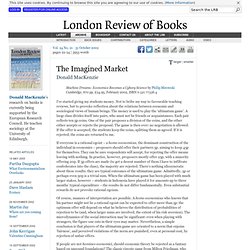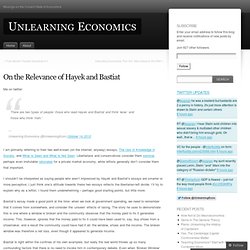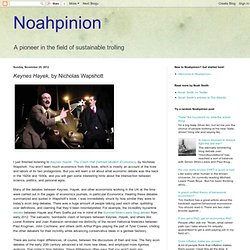

Donald MacKenzie reviews ‘Machine Dreams’ by Philip Mirowski · LRB 31 October 2002. Machine Dreams: Economics Becomes a Cyborg Science by Philip Mirowski Cambridge, 670 pp, £24.95, February 2002, ISBN 0 521 77526 4 I’ve started giving my students money.

Not to bribe my way to favourable teaching reviews, but to provoke reflection about the relations between economic and sociological views of human beings. The money is used to play the ‘ultimatum game’. A large class divides itself into pairs, who must not be friends or acquaintances. Each pair collects ten 5p coins. If everyone is a rational egoist – a homo economicus, the dominant construction of the individual in economics – proposers should offer their partners 5p, aiming to keep 45p for themselves. Of course, nuances of interpretation are possible. If people are not homines economici, should economic theory be rejected as a fantasy based on unsound foundations? You are not logged in.
On the Relevance of Hayek and Bastiat. Me on twitter: There are two types of people: those who read Hayek and Bastiat and think 'wow,' and those who think 'meh.'— Unlearning Economics (@UnlearningEcon) October 14, 2012 I am primarily referring to their two well-known (on the internet, anyway) essays, The Use of Knowledge in Society, and What Is Seen and What Is Not Seen.

Libertarians and conservatives consider them seminal, perhaps even irrefutable rationales for a private market economy, while leftists generally don’t consider them that important. I shouldn’t be interpreted as saying people who aren’t impressed by Hayek and Bastiat’s essays are smarter or more perceptive; I just think one’s attitude towards these two essays reflects the libertarian-left divide. Bastiat’s essay made a good point at the time: when we look at government spending, we need to remember that it comes from somewhere, and consider the ‘unseen’ effects of taxing. My major problem is how one-sided his essay is. Hayek, Friedman, And The Illusions Of Conservative Economics. The Great Persuasion: Reinventing Free Markets since the DepressionBy Angus Burgin (Harvard University Press, 303 pp., $29.95) JUST AS I WAS wondering how to start this review, along came the Sunday New York Times Magazinewith a short article by Adam Davidson with the title “Made in Austria: Will Friedrich von Hayek be the Tea Party’s Karl Marx?”

One Tea Party activist reported that his group’s goal is to fill Congress with Hayekians. This project is unlikely to go smoothly if the price of admission includes an extensive reading of Hayek’s writings. As Davidson remarks, some of Hayek’s ideas would not go down well at all with the American far right: among them is a willingness to entertain a national health care program, and even a state-provided basic income for the poor. The source of confusion here is that there was a Good Hayek and a Bad Hayek. But the Good Hayek also knew that unrestricted laissez-faire is unworkable. The Bad Hayek emerged when he aimed to convert a wider public. Keynes Hayek, by Nicholas Wapshott. I just finished listening to Keynes Hayek: The Clash that Defined Modern Economics, by Nicholas Wapshott.

You won't learn much economics from this book, which is mostly an account of the lives and labors of its two protagonists. But you will learn a lot about what economic debate was like back in the 1920s and 1930s, and you will gain some interesting hints about the intersection between science, politics, and personal egos. Many of the debates between Keynes, Hayek, and other economists working in the UK at the time were carried out in the pages of economics journals, in particular Economica.
Hearing these debates summarized and quoted in Wapshott's book, I was immediately struck by how similar they were to today's econ blog debates. There was a huge amount of people talking past each other, quibbling over definitions, and claiming that they'd been misinterpreted. There are some major differences, of course, between the discourses of then and now.